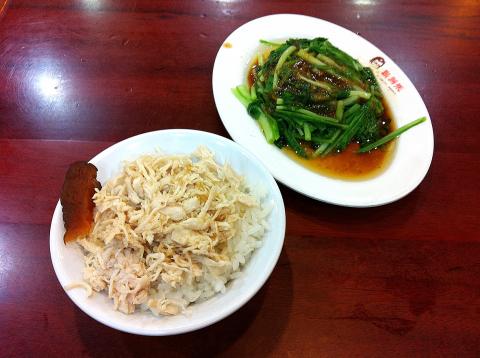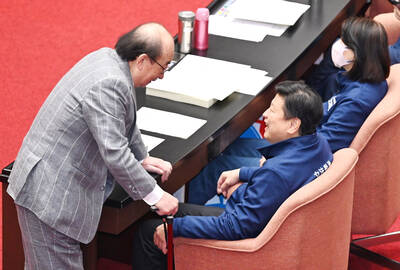If you like traditional Taiwanese food, you’ve probably heard of Formosa Chang (鬍鬚張). With more than 30 locations across greater Taipei, the restaurant chain has been in business since the late 1980s, and is one of the more successful ventures that have brought street food staples into the realm of mass production.
Part of that success has been the result of shrewd branding. Several years ago, Formosa Chang won cachet among Taiwanese hipsters when it teamed up with Pizza Cut Five, a boutique T-shirt design company, to create a series of T-shirts bearing the restaurant’s iconic logo, the bearded face of restaurant founder Chang Yan-chuan (張炎泉). The T-shirts, which featured Chang’s head refashioned in a variety of pop art styles, were a hit. To this day, black T-shirts emblazoned with the words “Formosa Chang Cut Five” in hot pink are the official staff uniform.
Fashion aside, hardcore foodies and penny-pinchers have reason to turn their noses up at Formosa Chang, which charges NT$30 for a small bowl of its specialty, braised pork rice (known in Mandarin as luroufan, 魯肉飯). You can get the same for NT$25 at a popular hole-in-the wall joint, Chinfeng Braised Pork Rice (金鋒魯肉飯), see page 14 of last Friday’s edition of the Taipei Times), and perhaps even cheaper at one of the countless mom-and-pop shops across the city serving similar fare.

Photo: David Chen, Taipei Times
But still, Formosa Chang’s braised pork rice is not bad at all. The restaurant’s version of this simple dish — bits of fatty pork stewed in sweet soy sauce and ladled on top of a bowl of rice — tastes fresh and homemade, and even won a voter’s choice award at Taipei City’s Traditional Food Carnival (台北市傳統美食嘉年華會) several years ago.
And here’s one plus to Formosa Chang’s chain restaurant approach: The food is consistent. You know what you’re going to get, and you know how it’s going to taste. In this light, a meal at Formosa Chang makes for a more nourishing alternative to a Big Mac and fries combo. A large bowl of braised pork rice, which comes with a slice of pickled ginger, costs NT$59. Have that with a side of boiled greens, (燙青菜, NT$40) — the restaurant serves whatever is in season — and a tea egg (NT$15), and you have a decent meal for just over NT$100.
Another simple yet classic dish on offer is chicken on rice (雞肉飯, NT$30 for a small bowl, NT$59 for a large bowl). You get shredded slices of boiled chicken topped with a spoonful of light gravy on rice. Another Taiwanese standard, pork ribs and bitter gourd soup (苦瓜排骨湯, NT$65), goes well with either rice dishes. If pig intestines suit your fancy, get the “four gods soup” (四神湯, NT$50), touted by the restaurant as a popular choice.
I’m not taken with all of Formosa Chang’s recommendations, which are trumpeted on stock promotional posters hanging on the walls of its restaurants. The roast salted pork (石板鹹豬肉, NT$60) is not nearly as appetizing as the photo suggests — in fact, it’s an utter disappointment.
For those on the go, Formosa Chang also sells lunchboxes, which are good value. Both the braised pork and chicken on rice lunchboxes are NT$79 and come with several veggie side dishes, a piece of tofu and a tea egg. The sliced beef and onions lunchbox (霜降牛丼便當, NT$79) is a nice and not-so-greasy option.
Formosa Chang’s atmosphere caters to the romantic idea of a traditional Taiwanese eatery, with wooden tables and stools. Relaxing jazz music is piped softly in the background, a la a Starbucks, and the waitstaff is clearly trained to be polite and efficient. A Formosa Chang branch might lack the down-home feel of your favorite street stand, but it’s a safe, reliable option if you’re in a hurry. And it beats McDonald’s any day.

Feb. 17 to Feb. 23 “Japanese city is bombed,” screamed the banner in bold capital letters spanning the front page of the US daily New Castle News on Feb. 24, 1938. This was big news across the globe, as Japan had not been bombarded since Western forces attacked Shimonoseki in 1864. “Numerous Japanese citizens were killed and injured today when eight Chinese planes bombed Taihoku, capital of Formosa, and other nearby cities in the first Chinese air raid anywhere in the Japanese empire,” the subhead clarified. The target was the Matsuyama Airfield (today’s Songshan Airport in Taipei), which

On Jan. 17, Beijing announced that it would allow residents of Shanghai and Fujian Province to visit Taiwan. The two sides are still working out the details. President William Lai (賴清德) has been promoting cross-strait tourism, perhaps to soften the People’s Republic of China’s (PRC) attitudes, perhaps as a sop to international and local opinion leaders. Likely the latter, since many observers understand that the twin drivers of cross-strait tourism — the belief that Chinese tourists will bring money into Taiwan, and the belief that tourism will create better relations — are both false. CHINESE TOURISM PIPE DREAM Back in July

Could Taiwan’s democracy be at risk? There is a lot of apocalyptic commentary right now suggesting that this is the case, but it is always a conspiracy by the other guys — our side is firmly on the side of protecting democracy and always has been, unlike them! The situation is nowhere near that bleak — yet. The concern is that the power struggle between the opposition Chinese Nationalist Party (KMT) and their now effectively pan-blue allies the Taiwan People’s Party (TPP) and the ruling Democratic Progressive Party (DPP) intensifies to the point where democratic functions start to break down. Both

This was not supposed to be an election year. The local media is billing it as the “2025 great recall era” (2025大罷免時代) or the “2025 great recall wave” (2025大罷免潮), with many now just shortening it to “great recall.” As of this writing the number of campaigns that have submitted the requisite one percent of eligible voters signatures in legislative districts is 51 — 35 targeting Chinese Nationalist Party (KMT) caucus lawmakers and 16 targeting Democratic Progressive Party (DPP) lawmakers. The pan-green side has more as they started earlier. Many recall campaigns are billing themselves as “Winter Bluebirds” after the “Bluebird Action”